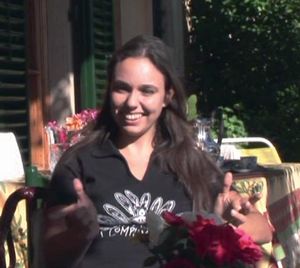Florentine actress, writer and vintner, Natalia Giucciardini Strozzi was recently confirmed as a descendant of the Mona Lisa. She is the daughter of Prince Girolamo Giucciardini Strozzi and Irina Reine. Her autobiography, Facile da ricordare, published in Italian by Polistampa, was a best-seller in Russia. Her personal stories are crowded with celebrities, from Nureyev and Gregory Peck to Alberto Sordi, Amintore Fanfani, Andrea Bocelli and Tony Blair. Trained as a ballerina, she is a lover of dance and cinematographic arts.

You come from two noble families. Tell us about your heritage.
Yes, I descend from two noble Florentine families, the Giucciardini and the Strozzi. Giucciardini was the famous historian and politician—Niccolò Machiavelli was his secretary. Many of Machiavelli’s manuscripts are still in our archives. We have some 40,000 original documents related to Italian history and an incredible amount of personal correspondence and letters that Giucciardini and Machiavelli wrote to each other. Machiavelli lived right across from our palace in Florence, the Palazzo Giucciardini.
The other family I descend from is the Strozzi line. The Giucciardini were counts and the Strozzi were princes, and the two were related through marriage. The Strozzi’s were enemies of the Medici family. The Medici’s kept us in exile, and throughout the Renaissance the two clans were constantly involved in a power struggle. The Strozzi’s were bankers and the Medici’s were doctors. They were arch opponents in the game of Florentine power.
You say the Medici were doctors, but didn’t they become bankers as well?
They became everything! We have portraits of the Medici in our house and people are often very surprised to see their paintings hanging in our dining room. ‘Why do you keep your enemies in your palace?’ they ask. The answer is actually two-fold. First of all, we respect them and their history. Secondly, to keep their portraits hanging above our dinner table is a small act of revenge. They’re all dead, you know. The real Medici line has died out—it no longer exists. Our extinct enemies are nothing more than paintings on a wall, and they’re forced to watch over the Strozzi’s, alive and well, in the 21st century, enjoying their dinner!
You wrote a book called Facile da ricordare. Tell us more about it.
My book is partly historical and partly autobiographical. Many of my family stories are quite interesting from a cultural perspective. Michelangelo, for example, gave drawing lessons to Luisa Strozzi—she’s one of my ancestors. They were quite good friends, and he even attended her wedding. In my book, there’s a picture of the Strozzi and Giucciardini family trees, which show that they were the main ancestors of Winston Churchill. And more recently, we’ve discovered that I’m related to the Mona Lisa!
My mother’s side of the family also has a very rich heritage. She was born in Paris, but her mother was Russian with Polish blood. On her side, we have a saint in the family, Saint Stanislao Kostka. He was very well-loved by Pope John Paul II.
The autobiographical part of Facile da ricordare recounts my experiences as a child, my encounters with many important celebrities at the time, and what my life was like as a ballerina in Russia as a young girl. I describe my relationships with the people I had the incredible good fortune to know as a child, like Gregory Peck, Hubert de Givenchy, Alberto Sordi, and Nureyev—he gave me my first pair of dancing shoes. I speak of how these famous and extraordinary people have truly touched my life.
Tell us more about your links with the Mona Lisa. What was it like to discover that you are related to one of the most mysterious women in the world?
I find it very exciting. It’s one thing for the family to believe that we descend from Lisa Gherardini del Giocondo, and it’s quite another thing to have it confirmed for the whole world. My grandmother used to tell my father that he was Mona Lisa’s descendent. And to be honest, when I look at that painting, I see my father in her—his smile is just like hers! I don’t look like her, though. My sister and I both look like our mother.
As a family, we’d never made any systematic effort to investigate the documents proving our lineage. In fact, they were damaged in 1966 during the flood, and they’ve only been restored recently. New studies show that we are 15 generations away from Lisa Gherardini on my Italian grandmother’s side. Her husband’s line, the del Giocondo, died out in the 1600s, but Lisa’s line continued. We descend from one of her sons.
How does your family heritage influence your daily life?
I always say that having a title today doesn’t mean a whole lot. Nonetheless, I was always taught ‘princely virtues’. Throughout my childhood, my parents tried to make me understand the importance of respect and humility—those are the main values that a princess should possess. People generally don’t think of humility as something that characterizes royalty, but in reality, you have to be humble in order to be truly noble. At least that’s the way it should be. Of course, there are many examples where this is not the case, but I, for one, feel the weight of my name. Privilege comes with an acute sense of responsibility. It’s like carrying the weight of a thousand years on your shoulders—as if the eyes of history were always upon you—and you need to find the way to move forward in a creative and useful way.







